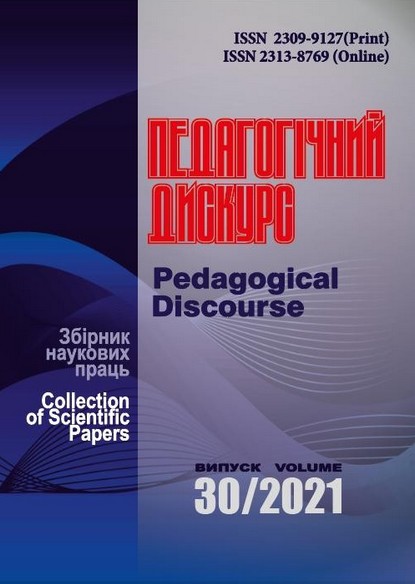Literary Text as an Illustrative Source of Meaning of Paradigms of «Success» in Pedagogy: E. Vodolazkin’s Novel «Brisbane»
Abstract
Success is an important factor in the increase of teacher competence, its implementation as a person, as the professional approach to teaching provides not only the appropriate level of knowledge, but also affects the formation of individual qualities of students. Therefore, the image created by the teacher plays a fundamental role in teaching students, thus, this article shows the implementation of the paradigm of "success" through the prism of pedagogical image. Russian scientist and writer of Ukrainian origin Yevgeny Vodolazkin (1964), based on his own experience of studying in Soviet schools and universities, in the novel "Brisbane" emphasizes the most important qualities that a successful teacher must have. The factors create the image of a teacher who (does not) lead to educational success (a teacher-despot LesiaKirillovna, a teacher-romantic Vira Mykhailivna, favorite teacher of solfeggio Claudia Vasylivna, a teacher and a close friend Olena Markivna, inconspicuous Pavlo Sergeev ,a moralist-director of the school, a gossip teacher of social sciences, psychologically stable Katya, nonconformist Ivan Sergienko, experienced professor Besedin , a relative of Lisa). Instead, the peculiarity of the observance of ethical relations in the scientific community among fellow philologists can be traced through the character of Associate Professor Chukin. Through the prism of the image of the protagonist of the work - Glib Yanovsky -, the way of the formation of his pedagogical skill and professional perfection is considered. In particular, the significant influence of the experience of relationships with teachers on the teaching practice of the protagonist has been established. The difference between university and school teaching has a particular importance. It is proved that political ideology (in particular, of the Soviet Union) directly influences teaching practice. Based on opinion polls and the novel «Brisbane», it is highlighted the most necessary professional, individual features and appearance of the teacher to implement successful interaction with students and the paradigm of «success» in a professional manner, emphasizing the importance of pedagogical qualities needed by modern teachers .
Downloads
References
«Brisbenn» Vodolazkin Yevgenij Germanovich – opisanie knig (b.d.). Retrieved from: https://ast.ru/book/brisben-839240/. [in Russian]
Vodolazkin, E. G. (2019). Brisben: roman. Moskva. [in Russian]
Yevgenij Vodolazkin (b.d.). Retrieved from: https://24smi.org/celebrity/59135-evgenii-vodolazkin.html. [in Russian]
Intervyu: Yevgenij Vodolazkin: «Chelovek – kak pechka: dolgo topica, potom greet drugix». (2019). Retrieved from: https://teletype.in/@vodolazkin/evgenij-vodolazkin-chelovek-kak-pechka-dolgo-topitsya-potom-greet-drugix. [in Russian]
Biografiya. Yevgenij Vodolazkin (b.d.). Retrieved from: https://evgenyvodolazkin.ru/biografiya/. [in Russian]
Intervyu: Licom k licu. Yevgenij Vodolazkin: «Kazhdy’j roman – e’to vnov’ sozdavae’my’j mir». (2019). Yunos’t, 8 (763), 120–124. [in Russian]
Ry’bakov, S. Yu. (2014). Duxovny’e processy’ i tendencii v sisteme sovetskogo obrazovaniya v period 30-90-x gg. XX stoletiya. Teoriya i praktika obshchestvennogo razvitiya, 13, 79–84. [in Russian]
Shevchenko, S. M. (2013). Stan rozvytku rosiiskykh shkil v URSR (kinets 30-kh – 40-vi rr. XX st.). Psykholoho-pedahohichni nauky, 5, 126–131.
Yaroshevych, O. V. (2015). Imidzh prepodavatelya kak sostavlyayushchaya kachestva sistemy’ geometro-graficheskoj podgotovki studentov. Innovacionny’e texnologii v inzhenernoj grafike: problemy’ i perspektivy’: sbornik trudov mezhdunar. nauch.-prakt. konf. (s. 140–149). Novosibirsk. [in Russian]
Zaxarova, S. M. (2016). Imidzh pedagoga kak sostavlyayushchaya professional’noj kompetentnosti. Molodoj ucheny’j, 5.1, 16–18. [in Russian]
Tymkiv, I. S. (2014). Vymohy do osoby vykladacha v suchasnomu osvitnomu prostori. Arkhiv klinichnoi medytsyny, 1, 109–111. [in Ukrainian]
Puchkov, A. A. (2012). Ideal’ny’j obraz prepodavatelya: sociologicheskij opros. Vy’sshee obrazovanie v Rossii, 6, 130–133. [in Russian]
Inozemceva, L. P. (2011). Imidzh prepodavatelya kak sostavlyayushchaya ego professional’noj lichnosti. Vestnik Chelyabinskogo gosudarstvennogo universiteta, 24, 231–232. [in Russian]
Larina, E. N. (2013). Izuchenie predstavlenij studentov o professionalno vazhny’x kachestv kak «idealnogo» i «real’nogo» prepodavatelya. Koncept, 11 (noyabr), 86–90. [in Russian]
Popova, O. Y. (2011). Imidzh prepodavatelya vuza: problema samorealizacii v obrazovatel’nom vzaimodejstvii. Pedagogicheskoe obrazovanie v Rossii, 4, 224–232. [in Russian]
Miasoid, H. I. (2015). Suchasni vymohy do vykladacha vyshchoi shkoly: ohliad tendentsii svitovoi pedahohichnoi praktyky. Pedahohichni nauky: teoriia, istoriia, innovatsiini tekhnolohii, 3, 107–113. [in Ukrainian]
Zahorui, H. V. (2010). Profesiohrama vykladacha vyshchoi shkoly ta shliakhy yii realizatsii (referat). Retrieved from: https://www.psyh.kiev.ua/Професіограма_викладача_вищої_школи_та_шляхи_її_реалізації_(реферат_Загоруй_Г.В.). [in Ukrainian]
Kolesnikova, L. N. (2011). Professionalny’j imidzh prepodavatelia. Ucheny’e zapiski, 209–215. [in Russian]
Pozina, L. T. (2011). Sovremenny’j obraz prepodavatelya vy’sshej shkoly’. Zapiski gornogo instituta, 193, 139–142. [in Russian]
Myronchuk, N. M. (2015). Kvalifikatsiini vymohy do vykladachiv vyshchykh navchalnykh zakladiv yak osnova zmistu osvitno-profesiinykh prohram pidhotovky fakhivtsiv. Problemy osvity, 82, 172–176. [in Ukrainian]
Belova, N. A. (2015). Povsednevnaya zhyzn’ uchitelej. Moskva. [in Russian]
Tipologiya prepodavatelej v vy’sshej shkole. (2013). Retrieved from: http://fevt.ru/load/pedagogika/tipologii_prepodavatelei/119-1-0-1491. [in Russian]
Modeli spilkuvannia ta ustanovka vchytelia (b.d.). Retrieved from: http://studentam.net.ua/content/view/3435/97/. [in Ukrainian]
Perfilova, T. B. (2004). «Stranstvuyushchie» sofisty’ v kul’turnom prostranstve provintcii (na primere biografii Libaniy. Izvestiya Rossiskogo gos. pedagogicheskogo universiteta im. A. I. Gercena. Obshchestvenny’e i gumanitarny’e nauki, 4, 7–15. [in Russian]
Kuvachov, V. P., Chorna, T. S., & Mitkov, V. B. (2019). Imidzh vykladacha, yak faktor motyvatsii studentiv. Udoskonalennia osvitno-vykhovnoho protsesu v zakladi vyshchoi osvity, 22, 216–225. [in Ukrainian]
Fedirchyk, T. (2009). Samorozvytok vykladacha yak skladova naukovo-metodychnoi systemy rozvytku yoho pedahohichnoho profesionalizmu. Naukovyi visnyk Chernivetskoho universytetu, 729, 137–144. [in Ukrainian]
Vnukova, O. M. (2016). Pozytyvnyi imidzh vykladacha yak pokaznyk yoho pedahohichnoi maisternosti. Humanitarnyi visnyk DVNZ «Pereiaslav-Khmelnytskyi derzhavnyi pedahohichnyi universytet imeni Hryhoriia Skovorody», 36, 15–21. [in Ukrainian]
Bibliia abo Knyhy sviatoho pysma Staroho y Novoho zapovitu. (1991). Sviata Yevanheliia vid Ivana. Ukrainske bibliine tovarystvo. [in Ukrainian]
Copyright (c) 2021 Pedagogical Discourse

This work is licensed under a Creative Commons Attribution-NonCommercial-ShareAlike 4.0 International License.

















